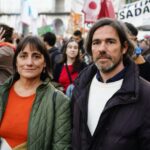
Last week, Argentina lost a lawsuit filed by four vulture funds before the London High Court related to “GDP coupon” bonds and must pay around 1,330 million euros.
These are the hedge funds, HBK Master Fund, Palladian Partners, Hirsh Group and Virtual Emerald International Limited, who sued the country in 2019 and requested compensation of up to 643 million euros.
Both Cristina Fernández and the employer opposition led by the Prime Minister of Finance of the government of Mauricio Macri, Prat Gay, spoke out about the decision of the London court. The vice president denounced that vulture funds always obtain sentences from foreign courts that grant “extraordinary returns” even though he omitted that during his government speculators also obtained exorbitant returns after buying bonds at auction prices. Prat Gay affirmed that the “GDP coupon” was the most expensive gift in history, it seems that the minister it is forgotten that he was part of a government that rewarded vultures like Paul Singer with returns greater than 1000%.
The decision of the London court is the consequence of the extension of jurisdiction in favor of foreign courts. What neither the vice president nor Prat Gay question is the transfer of sovereignty that was included in the debt operations.
What do the courts of the imperialist countries have to do with it?
In the 2005 swap, Claudio Lozano, former director of Banco Nación during the Frente de Todos government, details in the book The Illegitimate Debt that “the extension of jurisdiction before foreign courts was accepted. (…) maintaining the extension of jurisdiction implied upholding the criterion that Martínez de Hoz inaugurated in this matter in favor of creditors”. A criterion according to the economist that “all governments maintained from then on, violating the National Constitution.” The extension of jurisdiction consists of submitting eventual disputes to foreign courts and is a practice that spread during neoliberalism.
The conditions for the cession of sovereignty were established during the civic-military dictatorship of 1976. Esteban Mercatante indicates in the book La economía argentina en su laberinto that “barely twenty days after the assumption of the military Junta, decree law 21,305 was issued that modified article 1 of the Code of Civil and Commercial Procedure of the Nation in the sense of allow the extension of jurisdiction for patrimonial matters in favor of judges and arbitrators who act outside the Argentine Republic”.
First, this possibility was made subject to two conditions: that the jurisdiction is not that considered to be of public order and that the cause responds to an event prior to the extension. But then “Decree Law 22,434 allowed the extension without any preventive measures,” adds Mercatante. It was no coincidence that the public debt multiplied almost six times between 1976 and 1983.
The national deputy of the PTS in the Left Front, Myriam Bregman, maintained that “an elementary measure of national defense, of sovereignty, would be the declaration of absolute nullity of any extension of Argentine jurisdiction in favor of foreign arbitration and/or judicial tribunals in all those matters of law and national public order”.
The debt business
The bonds in dispute in London launched during the Néstor Kirchner government established payments to bondholders when economic growth for the year exceeded 3%. This bonus for speculators was paid, but it was interrupted in 2012. The Government changed the way GDP was measured (Indec intervened with mobs to hide the higher cost of living) and with this new estimate, economic growth was lower at 3% and therefore no payment was made. This is what the vulture funds demand.
In this exchange there were incentives for the bondholders, the adjustment for inflation in the values of the titles and the coupons tied to GDP growth, which meant a great additional cost and a premium for the bondholders. Claudio Lozano questioned what he called the mega swap between Kirchner, Duhalde, Lavagna and Prat Gay (who was president of the Central Bank until 2004) and pointed out that it was an unconstitutional, illegal and suspected swap. The effect operated by the incentives decreased the effective removal of the debt swap.
Among those who benefited from the Argentine debt and accepted the swaps (2005 and 2010) were George Soros, David Martínez (minority partner of Clarín), Kyle Bass, who made millions speculating on mortgages in the US while thousands of families lost their houses. These are some, but there are more. Both Cristina Fernández and Axel Kicillof admitted that those who accepted the exchange had profits of 300%.
After Mauricio Macri decided to pay everything that the vultures demanded. With the support of Congress, and the support of Peronism, the former president made the payment. Vultures obtained astonishing returns such as Paul Singer’s NML fund (1308% of invested capital), and Aurelius (846%). With this operation began the serial borrowing of Cambiemos that ended in the return of the IMF and the crisis.
The Frente de Todos government denounced the Macrista indebtedness, but then decided to validate the scam. Thus, the debt with the wolves of Wall Street was restructured and former minister Guzmán also granted more favorable collective action clauses to speculators. These clauses establish the conditions for possible litigation in the event of non-payment. Thus, it will be easier for them in the future to litigate in foreign courts. In addition, the agreement with the Fund, which maintains its old adjustment recipes, was renegotiated.
Through the debt mechanism, international financial capital carries out a permanent extraction of resources (surplus value) from the country and once again with the Fund in these pampas the noose will hang around the neck of the Argentine economy for a few more years.
In order to change the destiny of infinite decadence, the eternal return to submission to the Fund and to the wolves of Wall Street, it is necessary to make a sovereign decision to reject the payment of the debt based on popular mobilization. Freeing oneself from dependence on international financial capital is fundamental to reorganizing the economy so that all resources are directed towards development and attention to the most urgent social needs.
Source: www.laizquierdadiario.com

